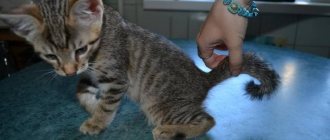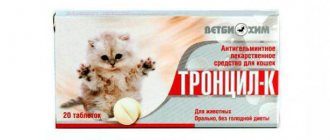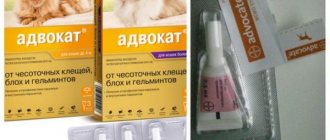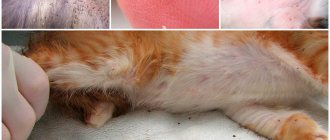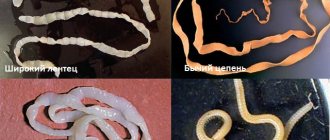Ways of infecting a cat with worms
Unfortunately, helminths in pregnant cats are very common. They affect not only cats that move freely on the street, but also those who do not leave the house.
There are several main ways cats become infected with worms:
- Food. Worm eggs can enter the body of a pregnant pet along with raw or undercooked meat or fish, as well as poorly washed fruits and vegetables.
- Water. The source of worm infection can be water from springs or other bodies of water. In rare cases, parasites can be contracted even through tap water.
- Human. Of course, all cat owners go outside and can bring worm eggs on their clothes or the soles of their shoes.
- Other animals. Infection can occur during mating, as well as if an already pregnant cat comes into contact with other animals that have free access to the street.
- Soil from pots with indoor flowers. Most cats love to dig in flower pots. Even soil that was purchased in a store can become a source of infection with internal parasites.
- Sand from a tray. Some owners, in order to save money, use ordinary street sand as a filler for the cat litter box. Very often, because of this filler, cats become infected with worms.
- Insects. Absolutely all domestic representatives of the cat family have a weakness for midges, flies and other insects and will not miss the opportunity to hunt for them. Sometimes such prey can be a source of helminth infection. In addition, fleas are considered the main carriers of worms, so it is very important to regularly carry out procedures to rid your pets of these insects.
Preventive measures
To prevent a cat from becoming infected with worms before pregnancy, owners must prepare for mating. Simple rules eliminate the possibility of infection of a pet:
- regular deworming - last time 1-2 weeks before mating;
- the cat invited for mating must also be non-infectious;
- avoid mating with homeless and stray animals;
- do not feed your cat raw meat, water, or rodents;
- regularly treat the fur with flea repellents;
- clean bedding, furniture, carpets, food bowls;
- periodically bathing the cat, walking with a flea collar.
On a note!
Precautionary measures are strengthened before mating. This eliminates the possibility of the cat becoming infected with helminths and minimizes the risks during pregnancy.
Signs of helminthiasis
You can suspect the presence of internal parasites based on the following external symptoms:
- indigestion (vomiting, diarrhea, constipation);
- frequent cough;
- changes in appetite (poor or increased appetite, perverted appetite);
- crawling of the animal on the floor on the pelvic part (itching in the anus);
- dull fur that sticks out on end;
- hair loss;
- blood and mucus in feces;
- mucous discharge from the eyes and nose;
- skin itching;
- allergic reactions;
- emaciation;
- sluggish, apathetic state of the animal.
It is impossible to independently determine the presence of helminthiasis, much less recognize the type of parasite. The above signs can easily be confused with the symptoms of many diseases (vitaminosis, diseases of internal organs, chronic intoxication, etc.). Therefore, if you suspect a helminthic infestation, you should contact a veterinarian.
After a professional examination, the pet will undergo the necessary diagnostic tests (analysis of feces, urine, biochemical and clinical blood tests, etc.). A diagnosis indicating the type of helminthiasis can only be made in a veterinary clinic after laboratory tests.
After identifying the parasite that has infected the animal, the veterinarian will advise how to remove worms from a pregnant cat and not harm the animal.
What is the danger of having parasites in the body?
Worms cause significant harm to the weakened body of a pregnant cat. They injure the intestinal walls, leading to blood loss, which increases the risk of infection with various viruses. Internal parasites also cause hypovitaminosis, anemia and exhaustion in pregnant cats.
The waste products of worms lead to intoxication of the body and disruption of the functioning of almost all vital organs.
For unborn kittens, they are dangerous due to the following consequences:
- Intrauterine infection with nematodes (roundworms). This type of internal parasite is considered one of the most common. Their larvae are able to penetrate the placenta and infect babies in the womb. With this infection, kittens are born very small. Subsequently, they are likely to be stunted and may even die within a month.
Important! Such worms pose a threat to the life of a pregnant cat only if their number has reached a critical level.
- Infection with helminths through mother's milk or saliva. Most often, nematodes penetrate the mammary glands and saliva of a pregnant cat. After birth, babies lick worms from their mother's nipples. In addition, a cat can infect her kittens when she licks them.
This type of helminthic infestation usually does not pose a threat to the life of kittens, but the lag in growth and development from their healthy peers will be significant.
Can deworming cause harm?
Complications can occur if the dosage is incorrect. An insufficient amount of the substance will keep the worms alive - they will continue to multiply and poison the body, which will affect the worsening of symptoms.
If kittens are overdosed or dewormed with adult medications, vomiting and diarrhea may occur. Gastrointestinal upset severely dehydrates the body, so animals will need the help of a veterinarian. Prolonged diarrhea in adult animals is safe for no more than 2 days, and in kittens – only 6-12 hours.
If you are hypersensitive to the active substances, itching or other allergic reactions, including anaphylactic shock, may occur. Other possible complications include:
- breathing problems (shortness of breath);
- blood pressure surges;
- excessive salivation and foaming (due to the bitterness of the medicine);
- stomach bleeding and kidney dysfunction;
- rapid weight loss.
In severe cases of helminthiasis and an excessively weakened body, taking anthelmintics can lead to multiple organ failure syndrome. This deadly pathology leads to rapid failure of all internal organs and systems. It is impossible to save an animal with such a diagnosis, so veterinarians recommend a full diagnosis before deworming in severe cases.
When deworming a pregnant cat is a necessity
Pregnant cats should be treated for worms if the presence of parasites prevents the cat from living and raising future offspring. The following dangerous signs of infection are identified:
- no appetite;
- noticeable deterioration in the animal’s condition;
- the presence of helminths can be traced in the feces.
If your pet looks cheerful and healthy and eats well, then it is better to hold off on taking anthelmintics. Taking the drugs can cause miscarriage, and if kittens are born, they may have congenital deformities.
But even though antiparasitic drugs are dangerous, if the animal has a lot of helminths, you shouldn’t think about whether it’s possible to deworm a pregnant cat. For a cat, and especially for kittens, such a manifestation of the disease is unacceptable.
Although the last third of pregnancy is a time during which even a very infected cat should not be treated. During this period, the poison from the medicine and dead parasites will have the most detrimental effect on the fetus.
As already mentioned, anything can happen, and an animal can get sick while pregnant. But these are rare cases, and if, for preventive purposes, periodic deworming and deworming of the cat before mating are carried out, then this problem will most likely be avoided.
Important tip! If you have a purebred cat and are looking for a suitable cat to breed with, be sure to make sure that the partner you choose is also parasite-free.
Features during pregnancy
Manufacturers of anthelmintic drugs do not recommend using them on pregnant or lactating animals. The point is not that this will affect the effectiveness of the drug (on the contrary, it will be just as effective), but rather because of side effects that in utero can negatively affect the offspring.
IMPORTANT! If helminthiasis does appear, but its consequences are not so significant, it is better to wait until childbirth, and only then, with the recommendation of a veterinarian, begin deworming.
In emergency situations, when treatment can no longer be delayed, it is simply necessary to deworm the pregnant cat . Then you need to know when, at what time and under what circumstances it should be done most correctly.
Do not neglect visiting a specialist, because only he can advise on the safest and best way to get rid of parasites. The most favorable time is considered to be approximately 40 days after pregnancy (3rd trimester).
Remember that it is a priori unsafe to deworm a pregnant cat, since anthelmintics are antiparasitic poisons whose purpose and active action are aimed at destroying worms.
And, often, they work effectively, but this certainly affects the condition of developing kittens, and not in the most positive way (up to the formation of mutations and the appearance of other abnormalities). Once in the body, the product begins to actively destroy adult parasites and their eggs located in the animal’s digestive system.
It is recommended to take antihelminthic drugs in two stages. The second portion is always taken after 2 weeks , since there is a possibility that not all eggs will be destroyed - new parasites that are not yet able to reproduce will hatch from them.
Carry out this procedure before conception - this way the toxicity of the drugs will not cause fatal consequences to the offspring during further pregnancy.
How to treat worms in a pregnant cat
It is impossible to identify worms in a pregnant cat on your own, because... multiple symptoms of helminthiasis can easily be mistaken for vitamin deficiency, chronic intoxication or allergies.
It is not recommended to treat helminthic infestations at home without consulting a specialist. In the 1st trimester of pregnancy, the formation of the kittens’ nervous system occurs, and the use of various medications by the animal can cause irreparable harm.
If you suspect a disease, it is recommended to contact a veterinarian who will conduct a professional examination of your pet, after which the following diagnostic tests will be prescribed:
- stool and urine analysis;
- clinical blood test;
- blood chemistry.
Only in a veterinary clinic can an accurate diagnosis be made and an effective treatment prescribed. If the parasites identified by the doctor do not pose any threat to the health of the mother cat and her kittens, measures to eliminate them can be postponed until the birth of the offspring. If laboratory tests show that the cat is infected with helminths, the larvae of which are able to penetrate the placental barrier, treatment cannot be avoided in the 2nd trimester.
Treatment should be started if the following symptoms are present:
- lack of appetite;
- lethargy;
- dull coat;
- presence of helminths in feces.
If your four-legged friend feels good, behaves cheerfully and actively, there is no need to take risks, because... the use of certain drugs can result in premature birth or the development of pathologies in kittens.
When and how often to worm a cat
Calculating how to properly deworm a cat is quite easy. To do this, you need to understand the purpose of the event:
- Prevention
. If the pet is kept at home, then it is treated 2 times a year. If access to the street is not limited, then an anthelmintic is given every quarter. - Treatment
. The anthelmintic is given twice with a break of 10-14 days. Remember that the anthelmintic does not affect eggs.
The schedule can be shifted when traveling abroad or outdoors, undergoing surgery or vaccination, as well as participating in exhibitions. To avoid complications, including overdose, be sure to listen to the advice of your veterinarian and follow the basic rules.
Means for getting rid of worms
There are many drugs in the veterinary anthelmintic drug arsenal. This is due to the variety of forms and types of existing parasites. Many medicinal drugs have a wide spectrum of action, having a detrimental effect on several types of worms at the same time. The most widely used drugs are:
- Polyverkan,
- Prazitel,
- Febtal,
- Kanikquantel Plus,
- Dirofen.
Among this variety, the owner is often lost and does not know what anti-worming pills can be given to a pregnant cat.
Not all anthelmintic drugs can be used for a pregnant animal. The fact is that many medicinal substances themselves have a toxic effect on embryos and fetuses. Thus, Prazitel, Polyvercan, Kanikvantel-plus are under no circumstances used to treat pregnant females for worms. These drugs have embryotoxic and teratogenic effects (lead to impaired development and death of embryos and fetuses). Dirofen and drontal should not be given to a cat in the first half of pregnancy, but can be used in the second half. No later than three weeks before birth, you can use Helmimax-4.
If worms are detected at the beginning of pregnancy, then Milbemax will be a safe drug in this case. In addition to tablets, anthelmintics are widely used in the form of drops on the withers. Profender can be used in pregnant animals.
A veterinarian can recommend an effective and safe deworming remedy for a pregnant cat in a particular case. Deworming of a pregnant pet is best done under the supervision of a specialist. When processing independently, special attention should be paid to compliance with the instructions for use of a particular drug.
Before giving a tablet, suspension or using drops on the withers, the animal must be weighed and the required amount of medicine calculated. Under no circumstances should an overdose be allowed. For a pregnant cat, this can result in miscarriage or fetal pathology.
After treatment for worms, objects with which the animal comes into contact should be disinfected. Particular attention should be paid to the food bowl, water and tray.
Worms in a pregnant pet are a dangerous phenomenon both for the health of the expectant mother and for the normal development of kittens. If a helminthic infestation is suspected, a comprehensive study should be carried out and the type of parasites identified. A veterinarian can advise what to give a pregnant cat against worms, taking into account the stage of pregnancy, the type of helminths found, and the degree of infection of the body. The owner must understand that it is necessary to treat the expectant mother for worms. And so that deworming does not harm the health of either her or her offspring, you should choose the right drug and follow the instructions for its use.
General information
The most common type of parasitic worms are nematodes (roundworms), so we'll describe them first. The life cycle of these organisms is very complex; they are characterized by the “use” of arthropods and rodents. They are often found in people, especially children, who constantly put everything visible in their mouths.
READ The cat's lymph nodes are enlarged
Pathogenicity and general danger vary depending on the specific type of parasite, the physiological and physical condition of the animal, and other factors. As a rule, roundworms in adulthood do not pose a particular danger to the cat itself. Cases of intrauterine infection are also relatively rare, so there is no particular danger for kittens. But still, you should not forget about intoxication, since toxins do not have the best effect on the health of future offspring.
A cat can become infected by consuming food or water contaminated with worm eggs, as well as by eating intermediate hosts of the parasite, as we have already mentioned above. After infection, a larva emerges from the egg, pierces the intestinal wall, entering the blood vessels, and then, along with the blood flow, sets off on a long journey.
After 14 days, the worms, along with expectorated sputum, again enter the gastrointestinal tract, where they already grow to an adult state. Each female lays at least 500 eggs in just two weeks. With severe infections, the number of parasites in the intestines can become so large that the worms simply tear the walls of the organ.
During the first week after infection, diarrhea may occur, and very rarely, vomiting. Occasionally (usually with problems with the immune system), enteritis or colitis (inflammation of the small and large intestines, respectively) may develop. In pregnant cats, the disease is more severe: the animal’s body is already having a hard time because of the kittens, and therefore the toxins secreted by parasites can even lead to myocarditis and endocarditis.
Also, a strange rash may appear on your pet’s skin, and during the period of migration of the larvae from the lungs, a severe cough may develop. Three weeks after infection, the clinical signs subside and in the future nothing worries either the cat or its owners. Unfortunately, there are no specific studies yet that would indicate direct harm to kittens if the mother has roundworms in her body.
Diagnosis and therapy
In pregnant cats, the diagnosis is made based on stool and blood analysis (eosinophilia develops in the presence of worms). Serological testing of plasma is rarely used, since with many parasitic infections specific antibodies appear in it. It should be taken into account that the latter, as a rule, appear no earlier than three to four weeks after infection.
READ Selkirk Rex cat. Description, features, care and price of the Selkirk Rex cat
You can treat a pregnant cat for worms with mebendazole. The dosage of this drug is simple - 200 mg per cat, three times a day. But this is only in the first three days. Subsequently, they switch to a dose of 350-450 mg, also three times a day. The duration of therapy is at least ten days. In especially severe cases, steroids may be prescribed, but here the life and health of the kittens are in danger, so they resort to using these drugs only in extreme situations.
Deworming medications for a pregnant cat
When deworming a pregnant cat, which is recommended to be carried out no earlier than 6 weeks, the veterinarian must select the appropriate therapy, taking into account the following nuances:
- gestational age;
- degree of damage;
- pet's condition.
All anti-parasite products are classified as toxic substances. But how to give anti-worm tablets if they poison the helminths in the cat’s body, causing the following side effects in four-legged animals:
- change in blood picture;
- intestinal disorder.
To minimize the toxic effects of medications, it is necessary to choose gentle medications. Drugs that negatively affect the development of the fetus and can lead to its death include:
- Vermidin;
- Milbemax.
Safe veterinary drugs
If it is necessary to deworm a pregnant cat, it is better to use the medical product Drontal. Its dosage depends on weight, so for purrs with a body weight of 4 kg, 1 tablet is prescribed once. medications. If desired, the treatment is repeated. It is better to feed Drontal not in the evening, but in the morning during breakfast, mixing the pill into food. Another safe medicine for pregnant females is Profender, which is suitable from the first days of pregnancy, but is not permissible in the last month of gestation.
It is important for cat breeders to remember that during gestation, especially during anthelmintic therapy, purrs need maintenance therapy more than ever. An effective medication, Calcidi, which is a vitamin and mineral supplement consisting of calcium, phosphorus, and vitamin D. The medical product is useful during pregnancy because it eliminates stress conditions, prevents abnormal bone development and generally improves the health of the cat.
Cestodes
Cestodes are flat parasitic worms. Cucumber tapeworm is relatively common in cats. This, in general, is not surprising, since the “vehicle of transmission” is fleas. And they occur even in those cats who spend their entire lives in city apartments.
These parasites are much more dangerous than the worms described above. They can also cause many problems throughout their life cycle. In particular, due to echinococci, huge cysts can form in the internal organs of the animal. The latter occurs when a cat can be not only the definitive, but also an intermediate host.
Diagnostics
The diagnosis, as in the previous case, is made based on the detection of eggs and fragments of worms in the stool. Serological testing of serum is also possible. The larval forms of echinococci and alveococci are much more difficult to detect, and for this you have to resort to x-ray and ultrasound research techniques.
Before this, it is advisable to keep the animal on a starvation diet and feed it with barium gruel. Finally, practicing veterinarians believe that with cestodiasis the ESR increases and the degree of erythrocyte agglutination increases. But still, these symptoms are indirect, and therefore help little in making an accurate diagnosis.
Therapy
Treatment is pretty standard. Praziquantel is prescribed at 10-20 mg/kg live weight once. Occasionally the dosage is increased (as prescribed by a veterinarian) to 25 mg/kg. In alternative cases, niclosamide tablets are prescribed (each 2 g). On the first day, the cat is given a whole pill, in the next six days - half.
the procedure is relatively atraumatic, and therefore, in extreme cases, it can be prescribed even to pregnant cats. Mebendazole in loading doses can also be used during treatment. It, among other things, can destroy parasite larvae that have taken root in other organs and tissues. Of course, all medications and their dosages should be prescribed only by a veterinarian.
Tablets and suspensions
Lovers of furry four-legged friends often wonder what to do if a pregnant cat has worms, and how to deal with them so as not to cause harm. There are many remedies, and among them a special place is occupied by tablets, which have great advantages due to the following nuances:
- are produced based on weight, so it is not difficult to determine the dosage of the drug;
- the medicine can be mixed with food or water;
- many products are produced with the taste of meat and fish;
- No special conditions are required for storing tablets.
Before using the drug in tablet form, you must weigh your pet to determine the exact dosage. An overdose can cause side effects in an animal such as:
- vomit;
- diarrhea;
- bloody feces;
- apathy;
- copious secretion of saliva.
To get rid of worms, you can give your pets the following tablets:
- Gelmimax-4;
- Trontsil-K;
- Dirofen.
The suspension is always equipped with a dispenser. In the absence of this, the suspension can be given to the cat using a syringe. The required amount of suspension is drawn into a dispenser or syringe. The animal needs to be placed on your knees, calmed, open its mouth and pour the product onto the root of the tongue. If this fails, the drug should be mixed with food.
There are several types of anti-worm suspensions:
- Prazitel;
- Prazicide Plus;
- Dirofen;
- Dironet;
- Febtal combo;
How to give your cat medicine
Inexperienced owners often struggle trying to figure out how to deworm a cat that refuses medication. Not for the first time, spit out tablets gradually dissolve due to saliva, but still do not reach their destination. A frightened animal hides in the farthest corner and prevents any attempts to extract it from there.
This situation can be avoided if you think through everything in advance. The most important thing is to eliminate as much as possible all the exciting moments:
- Do not open medications in the presence of your pet. Measure out the required dose of tablet or suspension before the cat arrives.
- Wait for the right moment. It is easier to act in a state of rest or strong fascination with another object. Try gently waking your sleeping pet or giving him a pill when he persistently asks for food.
If you can’t do everything quickly, secure the cat on your lap with a blanket or towel, leaving only the head free. Gently open your jaws and place the tablet on the root of your tongue. After this, close your mouth and stroke your pet’s neck, provoking the swallowing reflex.
For the most aggressive and persistent, it is recommended to make a decoy by wrapping the tablet in a tasty piece of minced meat or cottage cheese. The medicine can also be crushed, mixed with water and served as a suspension.
A suspension or paste is more readily accepted by many animals, but there can be problems here too. If you are not yet comfortable with the deworming procedure, carry it out with the help of a second person. Later, you will learn how to quickly and deftly give your cat medicine.
Drops
Unlike tablets and suspensions, the drops contain 3 active ingredients, and therefore this drug has a wider spectrum of action. They destroy not only the parasites themselves, but also their larvae and eggs.
Drops are applied to those areas where the pet cannot reach:
- between the shoulder blades;
- on the upper or middle back;
- at the withers;
- at the base of the head.
It is strictly forbidden to apply this product if there are wounds or scratches on the animal’s body.
There are several drops to combat worms:
- Inspector Total;
- Droncite;
- Profender;
- Bars Spot-On;
- Advocate.
Treatment
Due to possible negative consequences, it is important to approach the choice of an antiparasitic agent very carefully. Many veterinarians recommend using Paracid, Drontal or Dirofen . These products will not cause “damage” to developing kittens, and are guaranteed to cleanse the adult cat’s body of parasites.
Manufacturers claim that these products:
- Safe for pregnant pets and their future offspring;
- Effectively and delicately cleanse the body of parasitic worms, as well as their larvae and eggs;
- Convenient to use - some products are sold in 2 versions: in liquid form in the form of a suspension (which also comes with a convenient syringe) and in tablet form.
Moderate use of these drugs is approved by experts. The main thing is to follow the instructions and dosage.
Kittens, after birth, are extremely vulnerable and require a lot of protection from worms. To prevent infection, we recommend deworming them with a special agent on the 22nd day after birth.
ATTENTION! A kitten can become infected with helminthiasis while nursing the milk of an infected mother, and even during fetal development.
Folk remedies
Few owners of four-legged pets know how to poison worms using unconventional methods, but their correct use is safe, non-toxic and harmless to the animal and its offspring. Among the most common folk methods of fighting worms are:
- Pumpkin seeds. Grind 5 g of the raw product and then add it to the animal’s feed. The procedure must be repeated within a week.
- Onion. The vegetable needs to be cut into 4 parts and pour 1 tbsp. warm water. The infusion should be given to the cat on an empty stomach for 7 days.
- Wormwood tincture. You need to give your cat alcohol tincture 2 times a day. She should be given at least 10 drops at a time. Feeding is possible only an hour after the procedure.
- Tansy flowers. 5 g of the plant should be poured into 200 ml of boiling water. The resulting mixture is infused for 1 hour. The pet must be fed with the strained ready-made product 2-3 times a day from a syringe for 1 week.
Trematodes
Trematodes are special parasites known as flukes. Many species of these worms live in the bile ducts of the liver, feeding on the tissues of the mucous membranes and blood. The life cycle of parasites is complex. Typically, it assumes the presence of freshwater snails and fish as intermediate hosts. Most trematodes are bisexual, so even one worm located in a pet’s liver will multiply intensively.
Fortunately, cases of perinatal infection do not occur in nature. However, there is a lot of indirect evidence that with the same opisthorchiasis, the frequency of miscarriages increases by approximately 7-11%. The data, to be fair, was taken from doctors who conducted research among representatives of small nations of the Far North. Veterinarians suggest that the situation is similar in cats.
What to do in this case? Paromomycin may be prescribed. It is poorly absorbed from the gastrointestinal tract and is excreted mainly by the liver (which is what is required when getting rid of trematodes). Prescribed in a dosage of 10 mg/kg live weight. Every day, once a day, for a week. Paromomycin is relatively safe during pregnancy due to its low concentrations in the blood and other body fluids. The only problem is mild gastrointestinal disturbances. Mebendazole can also be used in the doses already indicated above.
It is possible to use ivermectin and drugs based on it. Dose – 200 mg per animal, once a day, for two days. Studies confirm its comparative safety for the body of pregnant animals, but the medicine should still be used under the constant supervision of a veterinarian.
Prevention
Helminthic infestation in animals is excluded by careful adherence to preventive measures:
- It is recommended to give antihelminthic drugs to your pet every 3 months. This will not cause harm to the animal’s body, because drugs are given in small doses.
- Meat and fish products should be excluded from the cat’s diet, and drinking water should be settled or boiled.
- It is recommended to protect your pet from contact with street animals.
- Regular treatment of the animal's sleeping place and its tray with special anti-worm products will protect your pet from parasites.
- It is recommended to regularly clean the room where the cat lives using chlorine-based products.
Preventative measures to protect a pregnant cat from helminths are important because... During this period, there is a high probability of intrauterine transmission of parasites to kittens.
The main task of the owners is to worm the cat in order to protect it from parasites, preserve the health of the offspring and ensure its full development. And in order to avoid the harm of deworming, the drugs must be chosen correctly and the instructions must be strictly followed.
Is it possible to worm a nursing cat?
Your cat recently gave birth and is now actively nursing kittens. Everything is fine, but it turns out that the pet has worms. What to do and is it possible to worm a cat nursing kittens? It’s worth starting right away with the main thing: pets who have recently given birth should absolutely not undergo antiparasitic treatment. You need to wait at least a month after giving birth, and ideally six weeks. And then, this should be done only if the number of parasites in the animal’s body directly affects the cat’s health.
But even in this case, do not rush to remove worms from a nursing cat. It would be better if you consult a veterinarian about this issue first.
- Cat giving birth
- How to give a cat a deworming tablet
- Deworming tablets for cats and kittens
Immediate deworming
This option is usually chosen if the kittens are stunted in growth and development, and their mother has symptoms of intoxication or other diseases that were caused by the presence of worms in the body.
If the owners can feed the babies on their own, then any suspensions and tablets for deworming can be used to deworm the cat. In addition to transferring to artificial feeding, kittens must be isolated from their mother for 2472 hours until the active substances of the anthelmintic drug are completely eliminated from the body.
If the owners do not have the opportunity to feed the kittens without the participation of the mother cat, it is better to use folk remedies for deworming:
- garlic;
- pumpkin seeds;
- papaya;
- parsley decoction.
Important! When expelling helminths using traditional methods, it is recommended to give the cat activated charcoal or Enterosgel daily. This will help reduce the negative consequences of intoxication of the body.
In addition, veterinarians advise using drops on the withers to deworm nursing pets. Stronghold, Frontline, and Advantage are considered the safest.
These drugs have a long-term effect (about a month), and the effect of their use occurs after 12 hours. In addition, they are water-based, so they do not leave marks on the wool and are absorbed very quickly.
Prevention measures
To reduce or prevent the risk of helminth infection, you need to regularly treat your pet for parasites every three months. Eliminate raw fish and meat from your diet. Only boiled and settled water is poured. Do not allow them to eat feces after other animals, protect them from contact with them.
Before mating, worming is mandatory. It is necessary to regularly clean objects with which the animal is constantly in contact (trays, bowls, toys). It is recommended to do cleaning with chlorinated solutions.
It is also recommended to use a remedy made from tansy inflorescences. Brew 5 g of crushed plant in a glass of boiling water for an hour. Then the product is filtered. Give the pet a syringe to drink (2-3 ml) three times a day. For prevention, procedures are carried out in a course of 3-4 days. However, during pregnancy such a remedy is prohibited. This may cause a miscarriage.
If there are no symptoms indicating the presence of worms, then treatment for worms is not carried out. Even the weakest drugs can become toxic to future kittens. But more often than not, taking illegal drugs causes the animal to miscarry.
Products for kittens
It is advisable that antihelminthic drugs for young cats be prescribed by a veterinarian. They must be safe, low-toxic and effective against parasites. It is not advisable to dilute the suspension or divide tablets intended for adult cats. Pet pharmacies have products intended specifically for kittens.
From the age of three weeks, babies are allowed to be given Drontal, Prazicide, Trontsil K, Kanikvantel for deworming. For five-week-old kittens, the deworming drug Profender is intended, with Milbemax for six-week-old kittens. When three months are reached, the permitted list is supplemented by Pratel, Febtal, Polyverkan, and Inspector.
Milbemax
Anthelmintic tablets for kittens contain milbemycin and praziquantel as active ingredients. Thanks to its complex action, the anthelmintic is effective in combating various parasites. The medicine belongs to the group of moderately dangerous and in recommended quantities is not toxic to a growing organism. To achieve an anthelmintic result, a kitten weighing 0.5-1 kg requires 1/2 tablet. The advantage of the drug is that it can be given to the kitten along with food without laxatives. The cost of Milbemax for kittens is from 150 rubles.
Poliverkan
The sweet anthelmintic drug is available in the form of sugar cubes weighing 8 grams each. The therapeutic effect is due to the combination of oxybendazole and niclosamide. Polyvercan is prescribed to young cats whose weight exceeds 1 kg. The dose consists of half a cube per 1-5 kg of animal weight. It is added to the kitten's food or dissolved in drinking water. For treatment purposes, the dose is repeated after 10 days. And then they give the pet a prophylactic dose once a quarter. The average price for sugar cubes, packaged in eight pieces, is 400 rubles.



